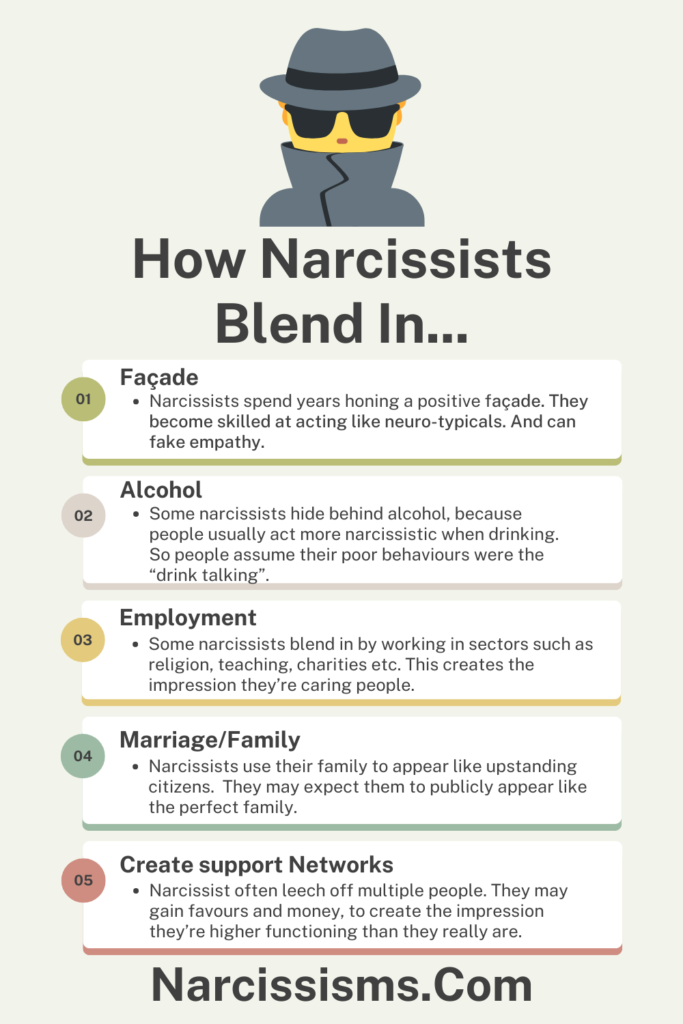Around one percent of the population is diagnosed with narcissistic personality disorder. But some studies estimate about 6% actually suffer from it. This means there’s lots of people undiagnosed.
Some narcissists are low functioning, and end up in prison, or in mental health services. But many blend in, and live relatively normal lives. With jobs, families, and friends.
Despite their different ways of thinking, many narcissists go undetected. Even to close friends and family. And never receive a diagnosis.
People may notice they’re difficult at times. And may have a gut feeling something’s “off”. But they usually have no idea they have a personality disorder. And are unaware of how much damage they cause others.
In this article I’ll explore how narcissists blend in. And how some manage to lead fairly normal lives. At least on the surface…
Please Check Out This Short Video To Aid Your Understanding…
Façade
Most narcissists are great actors. They spend their life playing roles to get what they want.
If a narcissist wants to get in someone’s good books, they learn what they value in a person. Then become that person. That’s why they’re sometimes referred to a shape shifters. The narcissist may use their chameleonic skills to attract a partner, land a job, gain favours, or make friends.
Narcissists have no core self. So they’re comfortable playing roles. And if they’re reasonably high functioning, most can create the impression they’re a normal empathetic person.
Narcissists operate under a trade off. They want narcissistic supply. Which consists of attention, adoration and other benefits, such as favours and material benefits. But they also need to manage their façade. Because their façade helps them get the things they want.
If they’re too ruthless to the wrong people, their reputation may be tarnished. And they’re less able to gain narcissistic supply. Because they’re avoided like the plague. So they must keep their narcissism in check, and be selective about when and where to drop their façade.
Higher functioning narcissists better understand the benefits of protecting their façade. And won’t take as many risks as lower functioning narcissists. Higher functioning narcissists play the nice act most of the time. And blend in well.
Lower functioning narcissists are more obvious. They’re more likely to be beggars and thieves. And most people sense they’re “undesirable”, and give them a wide berth.
Assumptions
Even higher functioning narcissists slip up with their façade management. Or trade it in when they really want something. But they usually get away with it.
Believing their false wholesome image, many people assume they’re having a bad day, stressed, or make other excuses for them.
Most people have little knowledge about narcissism. So they don’t notice the red flags. And even if they did, they can’t attribute it to a condition they’ve never heard of.
Understandably most people assume the narcissist is neuro-typical. And judge their behaviours through a neuro-typical lens. For example, if they witness them being argumentative with their partner for no reason, they may assume they must have been provoked earlier.
It’s natural to believe that people think similar to ourselves. So narcissists benefit from our assumptions they’re honest and decent people. And neuro-typical in thinking.
Alcohol
Alcohol is a great tool to help narcissists to blend in. Because most people act more narcissistic when drunk.
Many narcissists (but not all) drink regularly. And use alcohol to mask their narcissistic behaviours.
A narcissist acting narcissistic when drunk is not out the ordinary. Many people act this way. So it’s assumed it’s just the alcohol. But really alcohol gives the narcissist a free pass to unleash their narcissism. With no one suspecting this is who they actually are.
Employment
Some narcissists gain kudos from their jobs. And present a strong façade to impress their boss and colleagues.
People at work often see the best side of the narcissist. And believe they’re caring and conscientious. Because that’s how they portray themselves.
Narcissists usually play nice with those in powerful positions. And are good at selling themselves, and creating the impression they’re better workers than they are. This allows them to rise through the ranks. And be held in high regard.
Affiliations
Many narcissists blend in by joining affiliations that are associated with empathy and goodness. They may for example become involved in charity work or religion. And rise through the ranks of these organisations.
Narcissists let everyone know about their good deeds and affiliations. Whether overtly or subtly. Because they want their pound of flesh.
Narcissists understand that their associations make them appear kind and compassionate. And everything they do is interpreted in a better light. Helping them blend in as upstanding members of society. Who would suspect the local vicar was a narcissist?
Marriage/Family
Many narcissists are keen to get married and have children. But it’s not for the right reasons.
Narcissists like having partners to feel adored, have a bountiful supply of attention, and a slave to do their bidding. They often get married and have children to lock their partners in.
Narcissists know that someone who’s married with children won’t leave on a whim. Meaning they put up with more narcissistic behaviours. Allowing the narcissist to relax and drop their nice façade. This is why narcissists often treat their family much worse than they treat strangers.
Marriage and children also creates a better public image. They’re seen as more respectable. Marriage is still referred to as “doing the decent thing”. And married narcissists appear to be upstanding pillars of society.
Their partners usually do most of the house work, organise the finances, and look after the children. And the narcissist takes credit from their poor over worked spouses. Making them appear stable and family orientated. When really the family is just another thing they exploit.
Support Networks
Many narcissists benefit from huge support networks. The narcissist may charm, guilt, or coerce people into the role of their carer. Leaving them feeling responsible for the narcissist.
They might get their Mum to clean their house. Have friends lend them money. And colleagues cover for them at work.
Narcissists often place different roles on people in their life. And expect them to be useful for a specific purpose. This allows them to outsource their responsibilities. And because it’s spread out, no one realises how little they do for themselves.
This keeps their life fairly stable. At least more stable than if they were left to their own devices. And allows them to blend in as “normally functioning” citizens.
Final Thoughts
Most narcissists nurture positive public facades. Especially those more higher functioning. And this allows them to gain trust, favours, and keep narcissistic supply flowing.
Most narcissists become experts at blending in and appearing neuro-typical. And even when they slip up or cash in on their facade, it’s often assumed it’s a temporary blip.
Most people have little or no knowledge of narcissism. So even if they notice they have issues, they’ve no idea to what extent. Or the damage they can cause.
The more people that learn about narcissism the better. Because then narcissists are less able to blend in, and destroy people’s lives from within.
When they struggle to blend in and get their needs met, they’re more likely to seek help. Because at present, most narcissists don’t need help. Because in their mind, they’re doing fine the way things are. There’s so many vulnerable people to exploit, who are blissfully unaware of their tricks. So why would they change?
Please SHARE And Sign Up To My Newsletter. Sharing Pictures Of Fluffy Animals Is Nice. Sharing Info On Narcissism Is Life Changing!
Please CLICK HERE For How Narcissists Fake Empathy
Or Scroll Down For My Most Popular Posts (Mobile)…


The most toxic person I’ve known so far in my lifetime definitely had many of the traits of narcissism. Very grandiose, loud and attention seeking and very manipulative. I definitely had a strong feeling that something was “off” about her when the façade of normalcy was still in place. So I avoided her as much as I could, which wasn’t much at all. Going no-contact wasn’t an option so I opted for the Grey Rock method. It didn’t work very well, or perhaps I didn’t do it very well.
Fortunately she must have been low-to-mediocre functioning because it didn’t take long before the façade began to slip. She knew the right things to say but her delivery lacked sincerity. She loved to talk about herself to the point of over-sharing details that portrayed her in a disturbing light. Wanted attention so badly that if it wasn’t forthcoming, she pushed harder; even negative attention was better than none. The façade was crumbling like a cookie by then. She found it increasingly difficult to contain her malice and, if she had a grudge against someone, she’d sabotage their work by hiding forms and documents, putting filing out of order and stealing personal belongings. People began to complain.
That’s why I finally got to go no-contact, because she’d gone. Hopefully I won’t have the pleasure of meeting a more high-functioning narcissist any time soon!
It can sometimes be surprising how many people don’t notice, even though it’s obvious. That’s why I think much more education about narcissism needs to be out their!
Perhaps most of the others found out as she gradually showed her true colors, when red flags began to flap so loudly in the wind that nobody could ignore it.